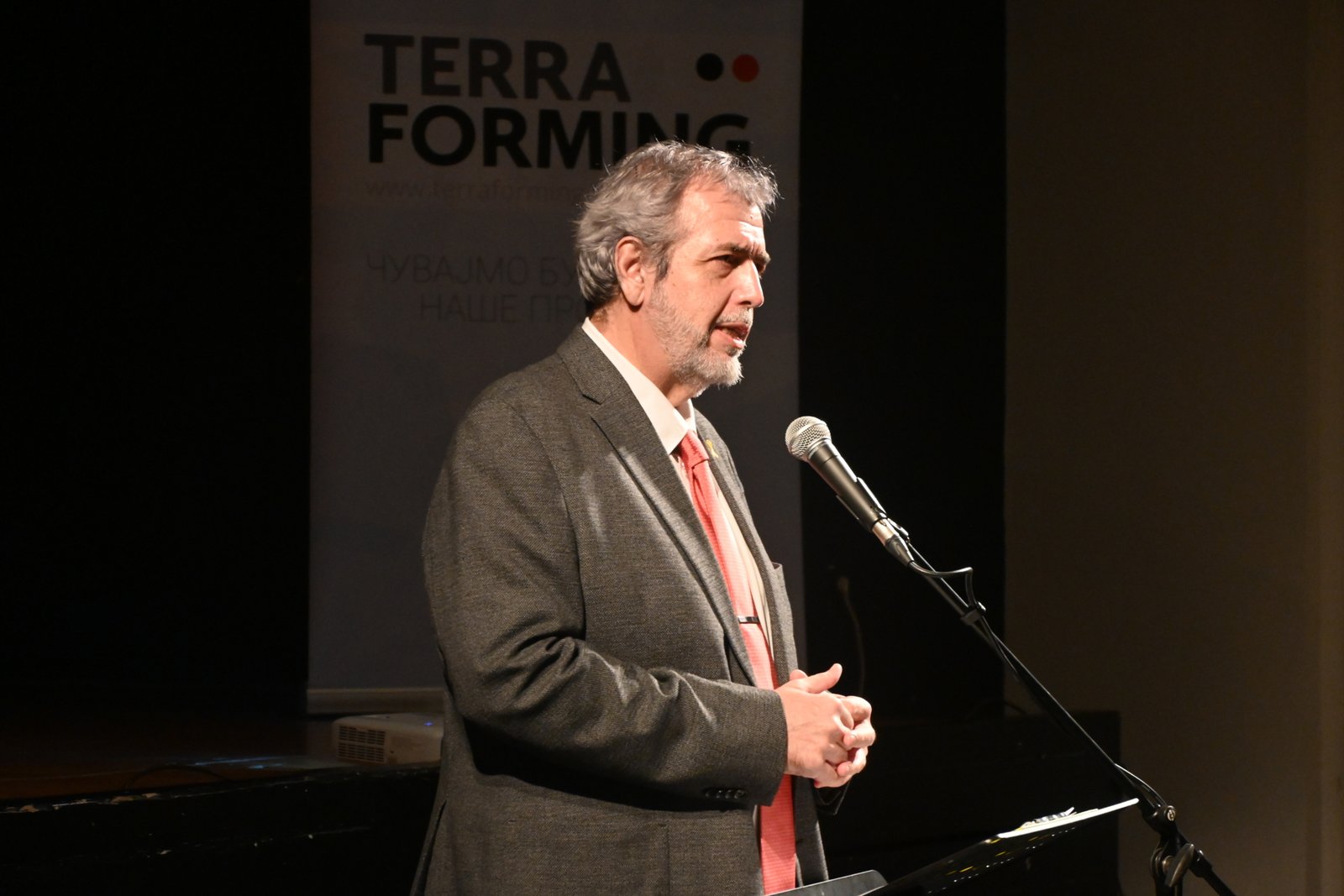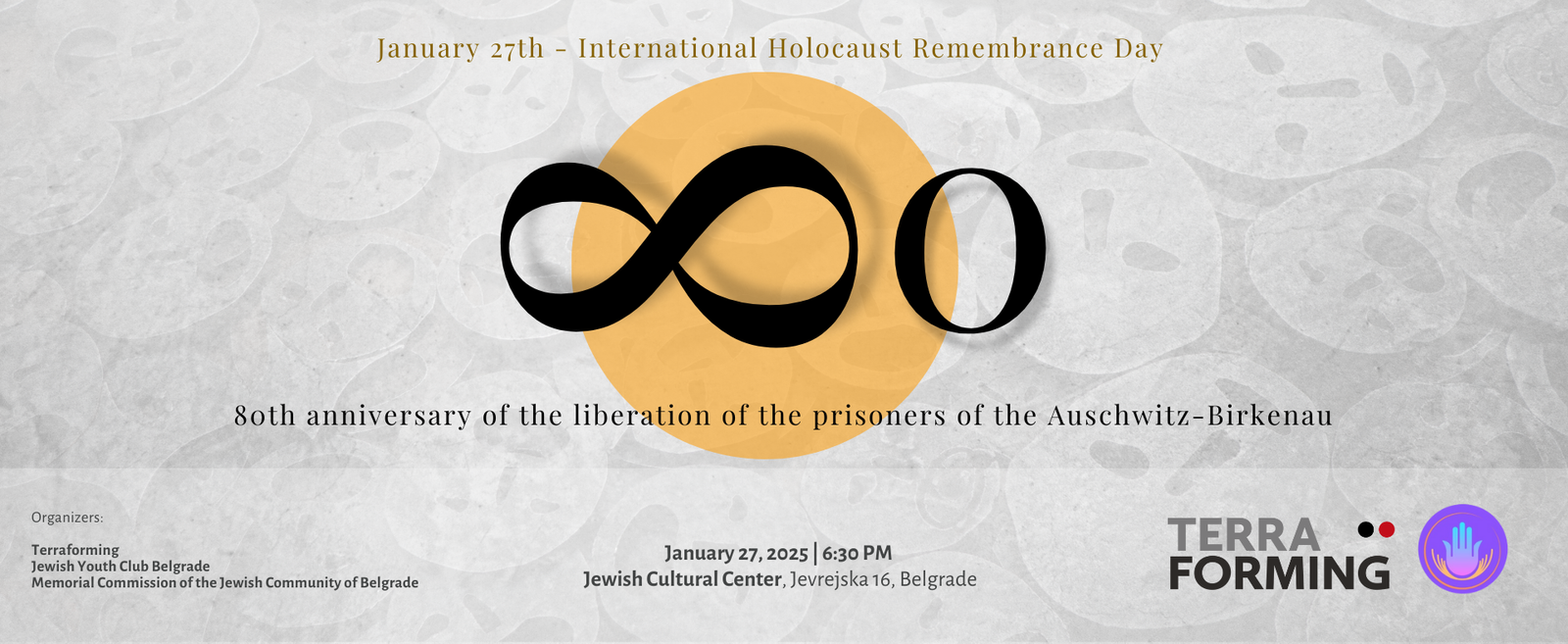80 Years Later
On the occasion of the 80th anniversary of the liberation of Auschwitz and International Holocaust Remembrance Day, Terraforming, the Jewish Youth Club Belgrade, and the Memorial Committee of the Jewish Community of Belgrade, organized an event at the Jewish Cultural Center to mark this important date, pay tribute to the victims, and discuss the culture of remembrance, contemporary challenges of Holocaust distortion and growing antisemitism.
Thank you to all who attended the event!
Program
At the beginning of the program, the attendees were addressed by the hosts, distinguished guests, minister of Human and Minority Rights and Social Dialogue, and ambassadors.
- Miško Stanišić, director of Terraforming
- Filip Belevski, deputy president of the Jewish Youth Club
- Ognjen Diamant, vice president of the Jewish Community of Belgrade
- Ambassador Avivit Bar-Ilan, Embassy of Israel
- Ambassador Christian Ebner, Austrian Embassy
- Ambassador Jan Bondy, Embassy of the Czech Republic
- Ambassador Emanuele Giaufret, the European Union Ambassador to Serbia
- Ambassador Pierre Cochard, Embassy of France
- Ambassador Anke Konrad, German Embassy
- Ambassador Charlotte Sammelin, Embassy of Sweden
- Ambassador Edward Ferguson, British Embassy
- Minister Tomislav Žigmanov, Minister for Human and Minority Rights and Social Dialogue of the Serbian Government.
“Thanks to You, I Remember: Memories of the Third Generation”
One of the highlights was the exhibition “Thanks to You; I Remember: Memories of the Third Generation,” prepared by the Jewish Youth Club. On eight panels, the Youth Club members presented 16 personal family stories of survival and Holocaust memory. Thus, the exhibition provided a space for young Jewish community members to take the narrative of Holocaust remembrance into their own hands and shape collective memory for future generations.
“ABC on Antisemitism”
Visitors could also see Terraforming’s exhibition “ABC on Antisemitism”,” which is part of the platform on contemporary antisemitism presented on the Center for Combating Antisemitism and Intolerance (CBA) website. The exhibition features 25 questions and answers on modern antisemitism in Serbia and internationally.
Short film “Why I Remember”
A short film, “Why I Remember,” was screened. It comprises statements by leading actors in Holocaust memorialization from many countries. They self-filmed and sent short videos specifically for this event in Belgrade. In their statements, they shared intimate and personal motifs that inspired them to keep the memory of the Holocaust alive.
Panel discussion: “80 Years Later: Antisemitism after the Holocaust”
The panelists:
- Isidora Jurjević – Program Coordinator of the Youth Club of the Jewish Community of Belgrade
- Borka Marinković – author of the book “The Record of the Holocaust – The Second Generation”
- Moderator: Miško Stanišić, Director of Terraforming and member of the delegation of the Republic of Serbia to the International Holocaust Remembrance Alliance (IHRA).
The panel discussion: “80 Years Later: Antisemitism after the Holocaust” addressed key issues related to Holocaust remembrance and contemporary challenges in the fight against antisemitism. This is how Miško Stanišić introduced each of the four topics in the discussion:
80 YEARS AFTER THE HOLOCAUST
80 years have passed since the liberation of the prisoners of Auschwitz-Birkenau, when, at least symbolically, the Holocaust ended – an event that marked the 20th century and forever changed our understanding of crime and evil, and what is humanly possible for man to do to another man. This event inspired the creation of the Charter of Human Rights; this bitter experience was embedded in the foundations of democratic values on which post-war Europe was built, first of all through valuing civil rights, the rule of law, and respect for human dignity – at least as something we strive for and which should be unquestionable and untouchable in modern society. At the same time, the Jewish community suffered an irreparable loss, with 6 million killed, and entire families and communities disappeared; in many places, cities, and regions, Jews were no longer there, and there are hardly any traces of the existence of a once rich culture and community that built and contributed overall development of European society. From January 27, when the Soviets entered Auschwitz, until today, our societies have come a long way. Europe was changing, and our society was changing. Unfortunately, we in Serbia also went through a bloody civil war, and as a society, we are still in transition.
In what way can we in our society, each from his position as researchers, civil society, and the Jewish community, contribute to raising awareness not only about the relevance of Holocaust memorialization but also establishing and strengthening the highest international standards in this field, not only from the point of view of civilization obligations towards the victims but also as a necessary instrument for strengthening and preserving fundamental democratic values? Where is the memory of the Holocaust in Serbian society today? Is the memory of the Holocaust and the understanding of the Holocaust relevant 80 years later?
ANTISEMITISM
All international indicators and research (FRA, OSCE, EU, research by civil society organizations and official institutions, Jewish organizations such as the World Jewish Congress, Anti-Defamation League ADL, Claims Conference, etc.) indicate that antisemitism has constantly increased in the last twenty years. Unfortunately, in the Republic of Serbia, we do not have mechanisms for reporting antisemitic incidents or for monitoring antisemitism. General knowledge about this specific hatred and understanding of the phenomenon of antisemitism is at a low level in Serbia. As a consequence, those who are supposed to shape public opinion as well as public policies to counter antisemitism have a questionable level of ability to identify contemporary antisemitism. That is why we can hear the common argument that “there is no antisemitism in Serbia,” which is simply impossible for a modern European society with a European cultural heritage of antisemitism and in the world of information technologies. In addition to the traditional right-wing pro-fascist antisemitism, in the last few years, especially after the attack by Hamas terrorists on Israel, we have witnessed the growth of left-wing antisemitism in Serbia. It is devastating that 80 years after the liberation of Auschwitz, we have to talk about the flagrant increase of antisemitism, both internationally and in our country. At the same time, we know that only strengthening awareness of the Holocaust as a historical event, that is, remembering the victims of persecution in the past, is not enough to oppose contemporary antisemitism.
How can we counter the growing antisemitism? What do we need to do to increase awareness of the presence of antisemitism in our society and then address the roots and manifestations of antisemitism in our society?
JEWISH COMMUNITY AND CONTEMPORARY HOLOCAUST MEMORIALIZATION
The culture of remembrance and in general, the memorialization of the Holocaust, which includes education, commemoration, and research work, at least on the international level, has gone through a process of intensive development, cognition, and establishment of standards and norms based on the rich experience of the most important world institutions that have been dealing with the memory of the Holocaust for decades through museum, educational, research and commemorative activities. As the realization matured that Holocaust memorialization is not only a shared obligation but also a need, international standards and norms were created, expressed through various documents and recommendations brought by the International Holocaust Remembrance Alliance IHRA as the highest authority in that field, but also UNESCO, UN, Council of Europe, and others. We also note that the interest of the international audience to visit museums, memorial centers, and authentic sites of the Holocaust has been steadily increasing over the last decade. Serbia joined these processes relatively late, and when we compare the situation in our country with the situation in the countries and leading institutions of Holocaust memorialization, the standards that are applied there and the degree of understanding not only of the importance and need for Holocaust memorialization, but above all of understanding what the purposes of the culture of remembrance are, and in what way it should be manifested, we can see that we still have a long way to go. One of the big problems we face in our country is the abuse of history for daily political conflicts, populist and nationalist propaganda, and some of the manifestations, announcements, and exhibitions instead of developing critical thinking and awareness of one’s own responsibility for the protection of democratic values inflame fear and hatred.
How can our society today better support and understand the Jewish community in the context of Holocaust remembrance? How can we achieve a more inclusive culture of remembrance in which new generations of Jews will have space to express and share their views, experiences, and narratives about the Holocaust? At the same time, it is an opportunity to promote reconciliation, and understanding, and fight against all forms of hatred and discrimination.
TECHNOLOGY AND HOLOCAUST MEMORIALIZATION
New technologies have long been an essential part of modern communication, including in the context of Holocaust memorialization. Digital Holocaust memory refers to using digital technologies for Holocaust remembrance, education, and research. This approach combines modern technologies, such as virtual reality, artificial intelligence, 3D scanning, holograms, digital archives, and interactive applications, but also relatively simple and accessible technologies and formats, such as podcasts and the use of social networks for campaigns and educational actions, to enable more profound and a more accessible understanding of this topic. At the same time, modern technologies are used to falsify and distort history.
How do we see the use of new technologies, including artificial intelligence, in the culture of remembrance of the Holocaust in general, but also to recognize and prevent the spread of denial and distortion of the Holocaust as well as antisemitism on the Internet? How do we balance freedom of speech and open hate speech, as well as subtle antisemitic propaganda? How do we see the future role of AI in shaping our collective memory of the Holocaust? What would be its positive and negative aspects?







